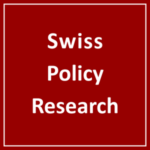WHO Mask Study Seriously Flawed
COVID19 - CORONAVIRUS, 14 Sep 2020
Swiss Policy Research - TRANSCEND Media Service
9 Sep 2020 – Some updates on the lacking effectiveness of facemasks:
- The much-cited WHO meta-study on facemasks, which claimed an 80% risk reduction and was instrumental in the global facemask policy shift, has turned out to be seriously flawed and “essentially useless”. The WHO meta-study fooled health authorities, “experts” and the media around the world. Read more about this latest health policy fiasco.
- In the US state of Kansas, the 90 counties without mask mandates had lower coronavirus infection rates than the 15 counties with mask mandates. To hide this fact, the Kansas health department tried to manipulate the official statistics and data presentation.
- Austrian professor Franz Allerberger found that the introduction, removal and re-introduction of mandatory facemasks in Austria had no influence at all on the coronavirus infection rate.
Given the rather clear evidence against the effectiveness of facemasks in the general population, health authorities should no longer assume or suggest that facemasks will reduce the rate or risk of infection.
**********
The WHO-commissioned meta-study on the effectiveness of facemasks, published in the medical journal The Lancet in June 2020, has been instrumental in shifting global facemask policies during the Covid-19 pandemic. However, the meta-study, which claimed a risk reduction of 80% with facemasks, is seriously flawed on several levels and should be retracted.

A. General flaws
- Of the 29 studies analyzed by the Lancet meta-study, seven studies are unpublished and non-peer-reviewed observational studies that should not be used to guide clinical practice according to the medRxiv disclaimer (references 3, 4, 31, 36, 37, 40 and 70; see table above).
- Of the 29 studies considered by the meta-study, only four are about the SARS-CoV-2 virus; the other 25 studies are about the SARS-1 virus or the MERS virus, both of which have very different transmission characteristics: they were transmitted almost exclusively by severely ill hospitalized patients and not by community transmission.
- Of the four studies relating to the SARS-CoV-2 virus, two were misinterpreted by the Lancet meta-study authors (refs. 44 and 70), one is inconclusive (ref. 37), and one is about N95 (FFP2) respirators and not about medical masks or cloth masks (see detailed analysis below).
- The Lancet meta-study is used to guide global facemask policy for the general population. However, of the 29 studies considered by the meta-study, only three are classified as relating to a non-health-care (i.e. community) setting. Of these three studies, one is misclassified (ref. 50, relating to a hospital environment), one showed no benefit of facemasks (ref. 69), and one is a poorly designed retrospective study about SARS-1 in Beijing based on telephone interviews (ref. 74). None of these studies refer to SARS-CoV-2.
- The authors of the Lancet meta-study acknowledge that the certainty of the evidence regarding facemasks is “low” as all of the studies are observational and none is a randomized controlled trial (RCT). The WHO itself admitted that its updated facemask policy guidelines were based not on new evidence but on “political lobbying”.
In view of these shortcomings, University of Toronto epidemiology professor Peter Jueni called the WHO study “methodologically flawed” and “essentially useless”.
B. Study misinterpretations
As mentioned above, several studies have been misinterpreted by the authors of the meta-study. All of the misinterpretations resulted in falsely claiming or exaggerating a benefit of facemasks. In the following, only the four studies relating to SARS-CoV-2 are reviewed. (HCW: health care worker)
- Ref. 44 (Heinzerling et al.): The meta-study claims that 0 of 31 HCW wearing a facemask and 3 of 6 HCW not wearing a facemask got infected. This is not correct: the study showed that 0 of 3 HCW wearing a facemask and 3 of 34 HCW not wearing a facemask got infected. This result was not statistically significant (p=1.00). Moreover, of the 3 HCW who got infected, one reported wearing a facemask “most of the time”, but the meta-study classified this HCW as “not wearing a facemask”.
- Ref. 41 (Wang et al.): This study, which did show a benefit of facemasks, was about N95 (FFP2) respirators in a health-care setting, not about medical masks or cloth masks.
- Ref. 70 (Wang et al.): The meta-study claims that 1 of 1286 HCW wearing a facemask and 119 of 4036 wearing “no facemask” got infected. This is not correct: in reality, 78.3% (94/120) of infected HCW were in fact wearing a surgical mask, and only 20.8% (25/120) did not wear any mask when exposed to the source of infection. The “1 of 1286 HCW” mentioned in the meta-study refer to HCW wearing an N95 (FFP2) respirator, not a medical or cloth mask.
- Ref. 37 (Burke et al.): This study had no result relating to the use of facemasks.
C. Studies relating to “social distancing”
In an additional section, the WHO meta-study evaluated studies on the benefit of “social distancing” measures. However, several independent experts have shown that this section is seriously flawed, too, as the authors again misinterpreted several studies and made several statistical errors. As with the studies on facemasks, all of these mistakes falsely claimed or exaggerated a benefit of “social distancing” measures.
For more information on this section, see PubPeer (and links therein) and the CEBM review.
∗∗∗
Original study: Chu et al., Physical distancing, face masks, and eye protection to prevent person-to-person transmission of SARS-CoV-2 and COVID-19: a systematic review and meta-analysis, The Lancet, June 2020.
See also: Are face masks effective? The evidence
__________________________________________
 Swiss Policy Research, founded in 2016, is an independent, nonpartisan and nonprofit research group investigating geopolitical propaganda in Swiss and international media. SPR is composed of independent academics that for personal and professional reasons prefer to protect their identities, and receives no external funding; there are no financial sponsors or backers. Our articles have been published or shared by numerous independent media outlets and journalists, among them Julian Assange, and have been translated into more than two dozen languages.
Swiss Policy Research, founded in 2016, is an independent, nonpartisan and nonprofit research group investigating geopolitical propaganda in Swiss and international media. SPR is composed of independent academics that for personal and professional reasons prefer to protect their identities, and receives no external funding; there are no financial sponsors or backers. Our articles have been published or shared by numerous independent media outlets and journalists, among them Julian Assange, and have been translated into more than two dozen languages.
Tags: COVID-19, Coronavirus, Facemasks, Pandemic, Swiss Policy Research
DISCLAIMER: The statements, views and opinions expressed in pieces republished here are solely those of the authors and do not necessarily represent those of TMS. In accordance with title 17 U.S.C. section 107, this material is distributed without profit to those who have expressed a prior interest in receiving the included information for research and educational purposes. TMS has no affiliation whatsoever with the originator of this article nor is TMS endorsed or sponsored by the originator. “GO TO ORIGINAL” links are provided as a convenience to our readers and allow for verification of authenticity. However, as originating pages are often updated by their originating host sites, the versions posted may not match the versions our readers view when clicking the “GO TO ORIGINAL” links. This site contains copyrighted material the use of which has not always been specifically authorized by the copyright owner. We are making such material available in our efforts to advance understanding of environmental, political, human rights, economic, democracy, scientific, and social justice issues, etc. We believe this constitutes a ‘fair use’ of any such copyrighted material as provided for in section 107 of the US Copyright Law. In accordance with Title 17 U.S.C. Section 107, the material on this site is distributed without profit to those who have expressed a prior interest in receiving the included information for research and educational purposes. For more information go to: http://www.law.cornell.edu/uscode/17/107.shtml. If you wish to use copyrighted material from this site for purposes of your own that go beyond ‘fair use’, you must obtain permission from the copyright owner.
Read more
Click here to go to the current weekly digest or pick another article:
COVID19 - CORONAVIRUS: